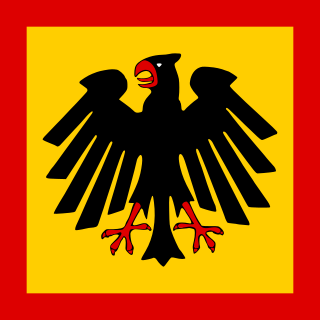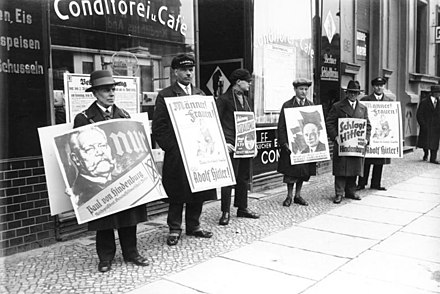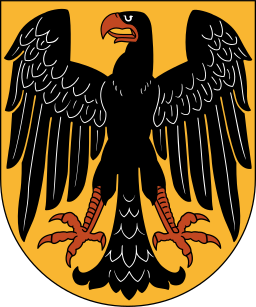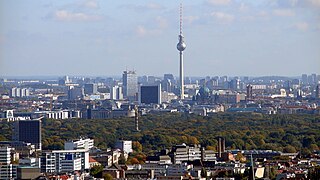
The Weimar Republic is an unofficial historical designation for the German state from 1918 to 1933. The name derives from the city of Weimar, where its constitutional assembly first took place. The official name of the republic remained Deutsches Reich unchanged from 1871, because of the German tradition of substates. Although commonly translated as "German Empire", the word Reich here better translates as "realm", in that the term does not have monarchical connotations in itself. The Reich was changed from a constitutional monarchy into a republic. In English, the country was usually known simply as Germany.

The Enabling Act of 1933, formally titled Gesetz zur Behebung der Not von Volk und Reich, was an amendment to the Weimar Constitution that gave the German Cabinet — in effect, Chancellor Adolf Hitler — the power to enact laws without the involvement of the Reichstag. The Enabling Act gave Hitler plenary powers and followed on the heels of the Reichstag Fire Decree, which had abolished most civil liberties and transferred state powers to the Reich government. The combined effect of the two laws was to transform Hitler's government into a legal dictatorship.

Alfred Ernst Christian Alexander Hugenberg was an influential German businessman and politician. A leading figure in nationalist politics in Germany for the first few decades of the twentieth century, he became the country's leading media proprietor during the inter-war period. As leader of the German National People's Party he was instrumental in helping Adolf Hitler become Chancellor of Germany and served in his first cabinet in 1933, hoping to control Hitler and use him as his "tool." Those plans backfired, and by the end of 1933 Hugenberg had been pushed to the sidelines. Although Hugenberg continued to serve as a "guest" member of the Reichstag until 1945, he wielded no political influence.

The German Centre Party is a lay Catholic political party in Germany, primarily influential during the Kaiserreich and the Weimar Republic. In English it is often called the Catholic Centre Party. Formed in 1870, it successfully battled the Kulturkampf which Chancellor Otto von Bismarck launched in Prussia to reduce the power of the Catholic Church. It soon won a quarter of the seats in the Reichstag, and its middle position on most issues allowed it to play a decisive role in the formation of majorities.
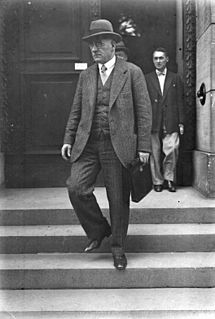
Otto Braun was a German Social Democratic politician who served as Prime Minister of Prussia for most of the time from 1920 to 1932. After the Nazis seized power in 1933, Braun went into exile in Switzerland.

Wilhelm Marx was a German lawyer, Catholic politician and a member of the Centre Party. He was Chancellor of Germany twice, from 1923 to 1925 and again from 1926 to 1928, and he also served briefly as Minister President of Prussia in 1925, during the Weimar Republic. He was the longest-serving Chancellor during the Weimar Republic.
Article 48 of the constitution of the Weimar Republic of Germany (1919–1933) allowed the President, under certain circumstances, to take emergency measures without the prior consent of the Reichstag. This power was understood to include the promulgation of "emergency decrees ".

Presidential elections were held in Germany on 29 March 1925, with a second round run-off on 26 April. They were the first direct elections to the office of President of the Reich, Germany's head of state during the 1919–33 Weimar Republic. The first President, Friedrich Ebert, who had died on 28 February 1925, had been elected indirectly, by the National Assembly, but the Weimar Constitution required that his successor be elected by the "whole German people". Paul von Hindenburg was elected as the second president of Germany in the second round of voting.

Federal elections were held in Germany on 5 March 1933, after the Nazi seizure of power on 30 January and just six days after the Reichstag fire. Nazi stormtroopers had unleashed a widespread campaign of violence against the Communist Party (KPD), left-wingers, trade unionists, the Social Democratic Party of Germany, and the Centre Party. They were the last multi-party elections in a unified Germany until 1990.

Federal elections were held in Germany on 6 November 1932. They saw a four percent drop in votes for the Nazi Party and slight increases for the Communists and the national conservative DNVP. It was the last free and fair all-German election before the Nazi seizure of power on 30 January 1933, as the following elections of March 1933 were already accompanied by massive suppression, especially against Communist and Social Democratic politicians. The next free election was not held until August 1949 in West Germany; the next free all-German elections took place in December 1990 after reunification.

Federal elections were held in Germany on 31 July 1932, following the premature dissolution of the Reichstag. They saw great gains by the Nazi Party, which for the first time became the largest party in parliament but without winning a majority.
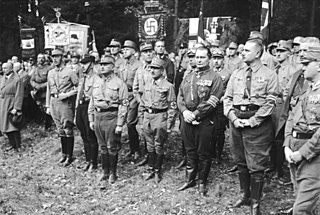
The Harzburg Front was a short-lived radical right-wing, anti-democratic political alliance in Weimar Germany, formed in 1931 as an attempt to present a unified opposition to the government of Chancellor Heinrich Brüning. It was a coalition of the national conservative German National People's Party (DNVP) under millionaire press-baron Alfred Hugenberg with Adolf Hitler's Nazi Party (NSDAP), the leadership of the Stahlhelm paramilitary veterans' association, the Agricultural League and the Pan-German League organizations.

Adolf Hitler's rise to power began in Germany in September 1919 when Hitler joined the political party then known as the Deutsche Arbeiterpartei – DAP. The name was changed in 1920 to the Nationalsozialistische Deutsche Arbeiterpartei – NSDAP. It was anti-Marxist and opposed to the democratic post-war government of the Weimar Republic and the Treaty of Versailles, advocating extreme nationalism and Pan-Germanism as well as virulent anti-Semitism. Hitler's "rise" can be considered to have ended in March 1933, after the Reichstag adopted the Enabling Act of 1933 in that month. President Paul von Hindenburg had already appointed Hitler as Chancellor on 30 January 1933 after a series of parliamentary elections and associated backroom intrigues. The Enabling Act—when used ruthlessly and with authority—virtually assured that Hitler could thereafter constitutionally exercise dictatorial power without legal objection.
The Imperial Agricultural League or National Rural League was a German agrarian association during the Weimar Republic. It was led by landowners with property east of the Elbe and was allied with the German National People's Party.

Gottfried Reinhold Treviranus was a German politician from the Conservative People's Party and a Reichsminister in both of Chancellor Heinrich Brüning's cabinets. In the first he was Minister for the Occupied Territories and then Minister without Portfolio ; in the second, he served as Minister of Transport.


